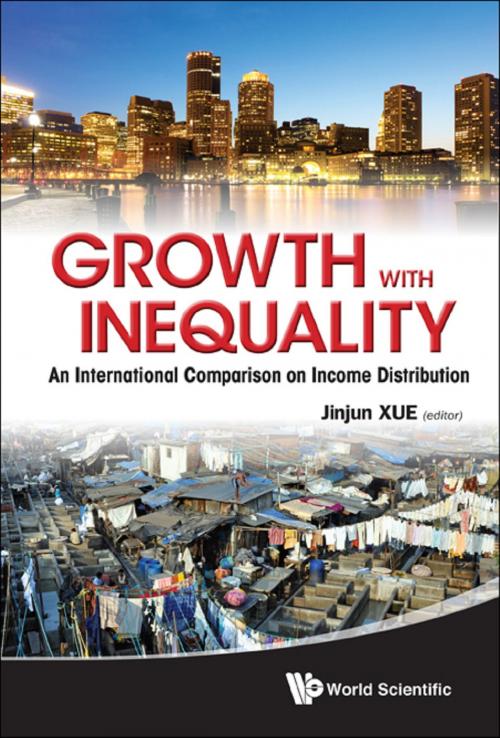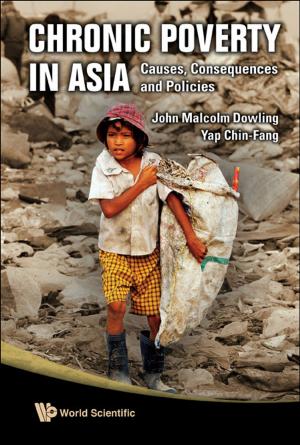Growth with Inequality
An International Comparison on Income Distribution
Business & Finance, Economics, Macroeconomics| Author: | Jinjun Xue | ISBN: | 9789814401715 |
| Publisher: | World Scientific Publishing Company | Publication: | July 13, 2012 |
| Imprint: | WSPC | Language: | English |
| Author: | Jinjun Xue |
| ISBN: | 9789814401715 |
| Publisher: | World Scientific Publishing Company |
| Publication: | July 13, 2012 |
| Imprint: | WSPC |
| Language: | English |
In the era of globalization and liberalization, the world is enjoying high growth as well as suffering from the ill-effects of unequal distribution of its economic outcomes. The activities of anti-government demonstrations in China and across the world via the Occupy Wall Street Movement highlight that inequality has become an international phenomenon. It is apparent in both poor countries under authoritarianism and rich countries governed by a democratic regime. Thus, inequality has become not only a hurdle to development but also a threat to social and political stability. The spread of the Jasmine Revolution across parts of North Africa and the Arab Spring are illustrative of what can happen under certain circumstances.
This book confirms the inconsistencies between high growth and increasing inequality via a series of case studies across 11 countries, numerous regions, and OECD members. Many of the case studies draw upon original household surveys. Our findings indicate the seriousness of income inequality, explore factors that have caused the inequality and analyze their economic and social consequences.
The book raises, and deals with, three key questions: (1) Can high growth reduce inequality gradually? (2) Can government intervention be effective in equalizing income distribution? (3) Is the income disparity an engine for, or an obstacle of, high growth?
Contents:
-
Globalization, Liberalization, Growth and Income Inequality:
- Growth and Inequality in China
- Growth and Inequality in Hong Kong
- Growth and Inequality in the United States
- Growth and Inequality in India
- Growth and Inequality in Germany
- Growth and Inequality in Korea
- Growth and Inequality in the UK
- Growth and Inequality in Indonesia
- Growth and Inequality in Thailand
- Growth and Inequality in Singapore
- Growth and Inequality in Japan
-
Factor and Policy Analysis on Income Inequality:
- Informal Employment and Income Disparity
- Educational Disparity and Income Disparity
- Housing Inequality and Underlying Factors in Urban China
- Agriculture Profitability and Income Disparity
- Labor Migration and Income Inequality
- Income Inequality, Labor Migration and the Lewis Tuning Point
- Trade-offs and Complementarities Between Growth and Inequality in OECD Countries
Readership: Researchers, students, government officers and general readers interested in income distribution studies.
Key Features:
- Income disparity is a hot topic in the 21st century. This book reflects the latest developments of economic growth and income disparity with case studies of 11 countries. It reveals how serious is the inequality, where inequality comes from and how to deal with these issues
- The book contains basic theories and analysis and methodologies for the subject of income distribution which helps readers to have a better understanding about growth and inequality and learn how to analyze the issues
- The empirical researchers conducted in the book are based on original household surveys and the latest public data. It displays a real picture of the countries with reliable data
- The authors are leading experts of the field and are from countries like China, India, Korea, Japan, the UK, the USA and Germany. They elaborate on the economic growth and income disparity in depth. Meanwhile, the emerging economies like China and India are main targets in the book
In the era of globalization and liberalization, the world is enjoying high growth as well as suffering from the ill-effects of unequal distribution of its economic outcomes. The activities of anti-government demonstrations in China and across the world via the Occupy Wall Street Movement highlight that inequality has become an international phenomenon. It is apparent in both poor countries under authoritarianism and rich countries governed by a democratic regime. Thus, inequality has become not only a hurdle to development but also a threat to social and political stability. The spread of the Jasmine Revolution across parts of North Africa and the Arab Spring are illustrative of what can happen under certain circumstances.
This book confirms the inconsistencies between high growth and increasing inequality via a series of case studies across 11 countries, numerous regions, and OECD members. Many of the case studies draw upon original household surveys. Our findings indicate the seriousness of income inequality, explore factors that have caused the inequality and analyze their economic and social consequences.
The book raises, and deals with, three key questions: (1) Can high growth reduce inequality gradually? (2) Can government intervention be effective in equalizing income distribution? (3) Is the income disparity an engine for, or an obstacle of, high growth?
Contents:
-
Globalization, Liberalization, Growth and Income Inequality:
- Growth and Inequality in China
- Growth and Inequality in Hong Kong
- Growth and Inequality in the United States
- Growth and Inequality in India
- Growth and Inequality in Germany
- Growth and Inequality in Korea
- Growth and Inequality in the UK
- Growth and Inequality in Indonesia
- Growth and Inequality in Thailand
- Growth and Inequality in Singapore
- Growth and Inequality in Japan
-
Factor and Policy Analysis on Income Inequality:
- Informal Employment and Income Disparity
- Educational Disparity and Income Disparity
- Housing Inequality and Underlying Factors in Urban China
- Agriculture Profitability and Income Disparity
- Labor Migration and Income Inequality
- Income Inequality, Labor Migration and the Lewis Tuning Point
- Trade-offs and Complementarities Between Growth and Inequality in OECD Countries
Readership: Researchers, students, government officers and general readers interested in income distribution studies.
Key Features:
- Income disparity is a hot topic in the 21st century. This book reflects the latest developments of economic growth and income disparity with case studies of 11 countries. It reveals how serious is the inequality, where inequality comes from and how to deal with these issues
- The book contains basic theories and analysis and methodologies for the subject of income distribution which helps readers to have a better understanding about growth and inequality and learn how to analyze the issues
- The empirical researchers conducted in the book are based on original household surveys and the latest public data. It displays a real picture of the countries with reliable data
- The authors are leading experts of the field and are from countries like China, India, Korea, Japan, the UK, the USA and Germany. They elaborate on the economic growth and income disparity in depth. Meanwhile, the emerging economies like China and India are main targets in the book















